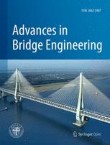Rail transportation is a climate-smart and efficient way to move people and freight, promoting economic growth while cutting greenhouse gas emissions. The current needs for faster and safer railway systems lead to routes with numerous bridges that represent key elements of the new train infrastructures. On the other hand, in many countries railway bridges form one of the major asset groups, with mature rail systems underpinned by thousands of existing structures that need to resist the dynamic loads from heavier and faster trains. Indeed, the increase in the train’s operating speed and axle loads, combined with modern designs of lightweight and slender bridges, is leading to increased dynamic effects in railway bridges that pose challenges for the network operability, as well as for the safety and comfort of the users. It is therefore important to better understand the behaviour of railway bridges subject to live traffic actions that may interact with other dynamic effects such as wind or earthquakes, and to propose efficient design, maintenance, and control strategies in these structures.
The large body of research conducted in this topic is at the core of the significant developments in railway infrastructures around the world in the last decades. Recently there have been key innovative contributions in the field of railway bridge dynamics, which is a highly demanded research topic. This special issue aims to collect high-quality research works on the dynamic response and control of railway bridges, covering topics that include, but are not limited to:
- Inter-operability of railway infrastructures under modern traffic actions
- Running safety of trains crossing bridges subject to wind actions
- Novel wind barriers for railway bridges
- Derailment problems in railway bridges under earthquake actions
- Innovative vibration control methods in railway bridges
- Modelling of train-track-bridge interactions
- Novel railway bridge designsDual railway-road bridges
- Damping in railway bridges
Schedule for the manuscript submission: As soon as possible and before 31 August 2024
Guest Editors
Jose Maria Goicolea, Department of Continuum Mechanics and Theory of Structures, Universidad Politécnica de Madrid, Spain
Email: jose.goicolea@upm.es
María D. Martínez Rodrigo, Mechanical Engineering and Construction Department, Universitat Jaume I, Castellón, Spain
Email: mrodrigo@uji.es
Alfredo Camara, Department of Continuum Mechanics and Theory of Structures, Universidad Politécnica de Madrid, Spain
Email: alfredo.camara@upm.es
Zhibin Jin, Department of Bridge Engineering, Southwest Jiaotong University, China
Email: jinzhibin@swjtu.edu.cn
Guest Editors for the Special Issue:
Dr Jose Maria Goicolea is a Full Professor of Computational Mechanics and Head of the Department of Structural Mechanics, at Universidad Politécnica de Madrid (Spain). He has published over 100 papers in journals and conferences in the field of structural dynamics and is active in the field of railway bridge dynamics under traffic actions. He has participated in the development of the 2nd generation of Structural Eurocodes in the area of bridge design and dynamic analysis, as well as other European regulations.
Dr María Dolores Martínez Rodrigo is a Full Professor in the Division of Continuum Mechanics and Structural Analysis at Jaume I University of Castellón, Spain. She belongs to the inter-university research group USUJI, devoted to improving the safety, functionality and sustainability of railway infrastructures based on prediction and experimentation in noise and vibration. Her research has resulted so far in more than 30 JCR indexed papers with close to 800 citations, 2 books, 10 book chapters and more than 70 publications in recognised international conferences. Currently, she is the Chair of the Mechanical Engineering and Construction Department, composed by 80 academics at Jaume I University of Castellón.
Dr Alfredo Camara is Associate Professor of Bridge Engineering at Universidad Politécnica de Madrid (Spain). He has worked as a researcher and academic in different universities of Spain, China and United Kingdom, where he established and led an interdisciplinary team on bridge dynamics. Dr Camara is author of more than 60 journal and conference papers in structural dynamics, most of them focusing on bridge engineering.
Dr Zhibin Jin is a Full Professor of Department Bridge Engineering at Southwest Jiaotong University (P.R. China). He is interested in vehicle-bridge dynamic interaction, especially in developing analytical solutions, highly efficient numerical algorithms, random vibration and reliability analysis. His recent work mainly focusses on numerical and experimental investigation on vehicle's running performance under earthquake conditions. He has published more than 30 JCR indexed papers with over 500 citations (according to Google Scholar) and obtained 27 patents.
